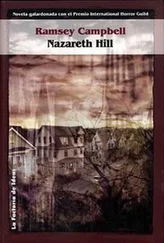We went back into the parlor; Tim sat down on the formal sofa, bored and unimpressed with the mansion, but amused by my first giddy moments at the controls of such magical powers to re-create it. I admired the porcelain figurines on the shelves and stopped to examine a miniature ship in a bottle on the fireplace mantel. As quickly as my mind recognized the ship, my thoughts replaced the plantation with ocean, and the mansion with masts and hull. Suddenly, we were deposited onto the deck of a sixteenth-century caravel on the high seas, and Tim was all enthusiasm. She was leaning-to in rough weather off the coast of a Caribbean island; there we were, dressed in our business attire like a pair of farcical bare-boat charterers. The caravel rolled sharply to port, forcing us to claw our way on hands and knees toward the starboard rail through a drenching saltwater spray; we kicked off our shoes to gain better hold of the slimy oak decking. With the next wave the ship listed heavily starboard, sending us scrambling back across the deck for the port rail. Despite the battering, the ship carried full sails on the foremast, main, and missen, and the tattered red and gold stripes of Spain. The deck was deserted. I made my way to the wheel to bring the ship under control and Tim went for the rigging to bring in the sails. He found a hatchet and cut loose the yards, sending the beams, ropes, and sails plummeting to the deck with a tremendous thud. With the reduction in wind power, the rudder responded and I was able to steer a course directly into the waves, stabilizing the ship. Tim made his way back to the transom over the heaps of canvas and rope littering the deck. He was dripping wet by the time I saw him, the long locks of his dark brown hair matted to his forehead in jagged inky stripes, his shirt, pants, and suspenders torn almost to tatters and his round glasses lost to the sea.
“Maybe you could warn me next time you’re about to think about a ship!” he shouted, breathless, his ruddy face breaking into the smile of one who has shared a common peril and cheated a common fate. We fell off another crest and the ship lurched forward knocking him onto the deck. I had seen it coming and braced myself against the bulkhead.
“Next time!” I shouted back, laughing.
He collected himself and rose wearily to his feet. “Think calm seas!”
I did and the seas quieted instantly, as if two gigantic hands had reached down from the heavens to tuck and smooth the immense sheet of ocean, snapping the surface flat as a pane of glass. Tim folded back the sails and cleared a place to sit on the starboard side of the deck facing the island.
“My grandfather took me sailing on the Chesapeake Bay when I was a girl,” I said. “Sometimes I’d fall asleep with him at the helm and dream I was one of the early explorers lost at sea and sailing through a storm.”
A tropical breeze rocked the boat, cooling the warm touch of the sun. The mottled timbers and planks of the ship dried quickly with a powdery white brine on their surface. We floated adrift for a while with only the far-off sound of gulls and the easy slap of water against the tired wooden hull breaking the silence. I unbuttoned the neck of my blouse and Tim helped me roll the sleeves up to my shoulders for me. He seemed very uncomfortable doing this, and happy when it was over. We stretched out on the sun-splashed deck, propping our heads against a hatch cover.
I soon fell asleep in this paradise, and in my dreams I returned to the Chesapeake Bay. I was on my Pop Pop Bellini’s sailboat and he was teaching me to steer. The pink skin of his bare chest and shoulders added color to the spotless white fiberglass coaming around the cockpit of the boat; a weathered, old blue captain’s hat shaded his eyes as they darted from the jibsail to a landmark on shore toward which he told me to steer to make the most efficient use of our tack. The day was perfect, breezy, and warm; as soon as we sailed out of sight of Havre de Grace he allowed me to take off the life jacket my parents insisted that I wear because swimming with one arm is virtually impossible. These little signs of trust made me adore him. We talked about school and sports, even boys and music, anything I wanted. Although he was an attorney, Pop Pop Bellini’s manner was informal and easy, the way men confident of their position in life tend to be. My other grandfather, Grandpa Cuttler, was more uncertain of himself and, because of that doubt, less comfortable with me after the accident. He never stopped blaming himself for what happened, and I never had the courage to tell him I’d done it on purpose to release his guilt; we didn’t have much to talk about except the energy crisis and Jimmy Carter and the demise of the American farmer. But with Pop Pop Bellini, whose interests were vast, I could talk about anything-except Uncle Anthony, and my mother’s drinking habits, both of which tapped into emotions so intense that even he could not control them. Regardless of the subject, he spoke of all things-politics, history, art, science, religion-in terms of right and wrong, fair and unfair. I guess this is what being a lawyer did to him. Francis Bellini, Jr., Esq. saw the world in black and white; he had no belief in gray. Neither did I, which is another reason why we got along so well. He was successful and well-respected, one of the high priests of justice upon whom God smiled; he was my role model and my hero. I loved my father dearly, but I never aspired to be like him because he and my mother had always bathed themselves in those confusing shades of gray.
We anchored at the mouth of the Sassafras River for lunch and returned to the harbor by five, a glorious day; but as we motored into the slip, the boat and the harbor faded away in my dream, and I found myself back at the convenience store, carrying Sarah up to the counter, then alone with Luas in the train shed. Even while dreaming I felt the frustration of that gap in space and time. Then my dream descended into a more bizarre realm.
My little brother Helmut and I are playing near the beautiful sandbox built lovingly by our father out of colored bricks and mortar. Papa had arranged the bricks on three sides of the box into patterns of ducks and flowers and extended the backside into a wide brick patio area, the opposite end of which turned ninety degrees straight upward into a chimney stack. Beds of roses, carnations, and begonias surround the two opposite ends of the sandbox, and our lush green lawn spreads across the front.
Despite the obsessive state of tidiness in which my father maintains our patio and yard, the sand in the box is excreting a putrid odor. I do not want to play in it until papa adds fresh sand, and I tell Helmut he should stay away too, but he plunges in without concern. Soon his legs, hips, and torso are swallowed up, as if he is sinking in quicksand.
“Help, Amina! Help me!” he cries. I reach in to grab him, but as I peer over the edge into the box I realize there is no sand after all. Instead, the arms of thousands of cadavers, tangled, blackened, and rotting, are swarming around like snakes inside the box, clutching at Helmut, pulling him down into an immense grave that extends deep into the earth, as if the box is situated over a portal into hell itself. I call to papa for help and pull as hard as I can to free Helmut, but I cannot overcome the strength of all these thousands of arms.
When the last traces of Helmut’s blond hair vanish into the chasm, I suddenly awaken from the dream. Tim Shelly is holding my left arm and pulling me back onto the deck of the caravel. I had been teetering on the edge of the cargo hatch, my screams echoing out of the hold as if they were too horrified to stay below. Then the ship and the ocean disappear, and I am standing on the porch of Nana’s house. Nana takes my hand, thanks Tim for looking after me, and leads me upstairs to my room.
Читать дальше












